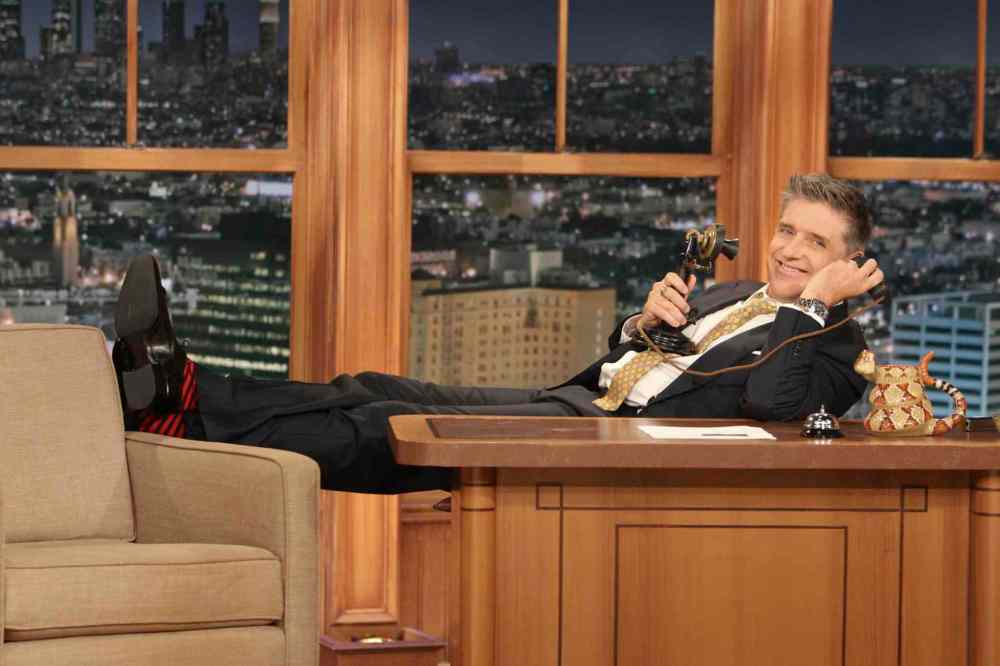Talkin’ ’bout a revolutionary
Craig Ferguson managed to put his lunatic spin on late-night TV while having real conversations with guests
Advertisement
Read this article for free:
or
Already have an account? Log in here »
To continue reading, please subscribe:
Monthly Digital Subscription
$19 $0 for the first 4 weeks*
- Enjoy unlimited reading on winnipegfreepress.com
- Read the E-Edition, our digital replica newspaper
- Access News Break, our award-winning app
- Play interactive puzzles
*No charge for 4 weeks then billed as $19 every four weeks (new subscribers and qualified returning subscribers only). Cancel anytime.
Read unlimited articles for free today:
or
Already have an account? Log in here »
Hey there, time traveller!
This article was published 17/12/2014 (3410 days ago), so information in it may no longer be current.
As exits go, this isn’t exactly one of those momentous, end-of-an-era, void-that-can’t-be-filled, things-will-never-be-the-same kinds of farewells.
But it needs to be said that Craig Ferguson’s departure from the late-night talk-show landscape (Friday, Dec. 19 at 11:35 p.m. on CBS) is significant, and that his contribution to the genre during a decade (2005-14) as host of CBS’s post-Letterman fixture The Late Late Show has been unique, consistently inspired and dependably delightful.
Ferguson, of course, is a Scottish-born actor/writer/comedian who, before landing The Late Late Show after previous host Craig Kilborn left in 2004, was best known to North American audiences as Nigel Wick, smarmy English boss to Drew Carey’s sitcom persona.

When he won the guest-host runoff to become The Late Late Show’s permanent desk jockey (other prime candidates for the gig included Michael Ian Black, D.L. Hughley and former MTV VJ Damien Fahey), Ferguson quickly demonstrated that he intended to impart a distinctly personal spin on the late-night format.
In creating his version of The Late Late Show, Ferguson embraced the genre’s traditional structure but refused to be constrained by its most cookie-cutter-ish conventions. The show had a monologue, but not one filled with writers’-room-written gags about celebrities and politicians; instead, each night’s show opened with a rambling, loosely structured and — when he intended it to be — sharply funny tirade about whatever happened to be on his mind.
He has also not been afraid to get serious, using his opening address to eulogize his parents, and famously (in 2010) discussing his own past as an alcoholic as a rationale for no longer doing jokes about the personal problems of Britney Spears and other damaged celebrities.
Ferguson also rejected the traditional talk-show trope of the sidekick/second banana, not by refusing to have one by but installing an absurd (and, as the character evolved, inspiredly insightful) robot skeleton named Geoff Peterson (created by MythBusters’ Grant Imahara and voiced/controlled by Josh Robert Thompson) as his sounding board and comedic sparring partner.
From his frequent hand-puppet-delivered openings to his wildly irreverent sketches (his grotesquely costumed Prince Charles was a personal favourite) to his inclusion of pantomime horse Secretariat into the running gag stream, Ferguson was willing to take The Late Late Show’s comedy to the far borders of silliness.
But when it came to the meat of the show, Ferguson distanced himself from his late-night contemporaries by actually bringing substance to the “talk” portion of the talk-show equation. Every night, with every guest, Ferguson made a point of ripping up the prepared note/question cards and, by doing so, inviting his visitors to engage in an actual conversation rather that a series of pre-selected promotional talking points.
Nobody else in late night — at least, nobody since The Late Late Show’s original (1995-99) host, Tom Snyder — has been as good at making small talk entertaining. He asks questions, and then he actually listens to his guests’ answers and allows the conversation to follow its natural course, in ways that are usually funny but can also be heartfelt, emotional and enlightening.
Ferguson’s full-episode 2009 interview with Archbishop Desmond Tutu rightly earned him a Peabody Award, an honour given for “broadcasting excellence in news and entertainment.”
It’s fitting that Ferguson’s guest in his final show as a talk-show host is a guy who knows a thing or two about exiting the genre — former Tonight Show star Jay Leno, who will surely be able to share some insights on how to (and how not to) take a graceful final bow.
As stated before, his departure will not create a void that cannot be filled — in fact, The Late Late Show’s chair will soon belong to another British import, English actor/comedian James Corden, who takes over next March — but as he heads out the door, Ferguson should be remembered by fans of TV’s bleary-eyed hours as a very smart, very funny guy who showed reverence and great affection for the tradition-bound talk-show genre at the same time that he was gleefully deconstructing it.
brad.oswald@freepress.mb.ca Twitter: @BradOswald

Brad Oswald
Perspectives editor
After three decades spent writing stories, columns and opinion pieces about television, comedy and other pop-culture topics in the paper’s entertainment section, Brad Oswald shifted his focus to the deep-thoughts portion of the Free Press’s daily operation.
History
Updated on Thursday, December 18, 2014 8:54 AM CST: Replaces photo


